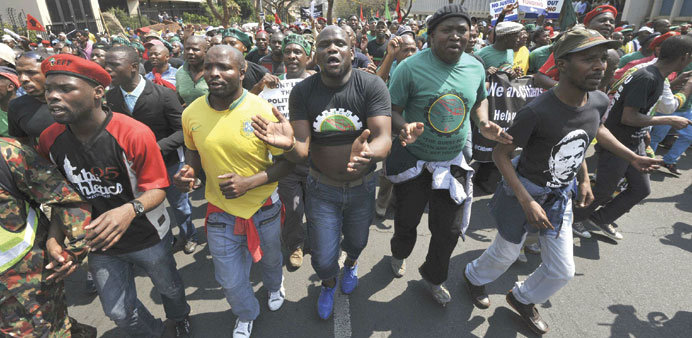|
Hundreds of demonstrators marched on South Africa’s government headquarters yesterday to protest a lack of state funding for survivors of police shootings at the Marikana mine, where 44 people died. |
The demonstrators—who included members of victims’ families and opposition parties—want the government to pay legal fees for about 270 injured or arrested miners appearing at the Marikana Commission of Inquiry.
The commission was appointed by President Jacob Zuma to investigate the police killing of 34 striking miners on August 16 last year at a mine run by platinum giant Lonmin.
In the run-up to these deaths, at least 10 other people—including two police officers—were killed during the highly charged strike.
Trevor Ngwane, a spokesman for the Marikana Support Campaign, said the mineworkers are facing a “David-and-Goliath battle” against the state, the police force and London-listed Lonmin.
“It’s very important to show the general public we are unhappy with the government,” said Ngwane, 53.
“It’s a tragedy, a shame and a disgrace really,” he said, lashing out at the government of the African National Congress (ANC), the party that led the fight to end white-minority rule in South Africa.
“It’s totally demoralising that the government of liberation could do something to the people like this,” he said.
Last August, Justice Minister Jeff Radebe said funding the legal team for the mine workers was unnecessary.
The approximately 270 injured or arrested miners and their lawyer, Dali Mpofu, withdrew from the Commission of Inquiry in protest and submitted an unsuccessful application to postpone the proceedings.
Yesterday’s protest was joined by social activists and opposition leaders, including Julius Malema, a firebrand proponent of mine nationalisation who was expelled from the ANC in 2012 for indiscipline.
Malema was accompanied by supporters of his newly formed Economic Freedom Fighters party.
The mineworkers’ leaders handed a memorandum of demands to an official from Zuma’s office.
They gave Zuma until the close of business today to respond.
They said their income tax payments should be halted if the government cannot provide funding, “so that they can fund their legal representatives directly”.
Armed riot police kept a close watch on the protesters.
Last Monday, the Commission of Inquiry’s chairman, retired judge Ian Farlam, ruled the hearings will continue, arguing that the absence of the miners would not hurt the proceedings.
“Without the participation of the victims, no credible or legitimate outcome can come out of the commission,” the mineworkers’ memorandum said. “Certainly no closure, reconciliation, truth and/or justice can result from it.”
Brutus Malada, a senior research fellow at the Centre for Politics and Research, a Pretoria-based think-tank, said the government would have gained some “moral high ground by showing sympathy” to the miners ahead of elections next year.
“Legally the government may be right, but morally the government is not gaining out of it,” he said.
“We are a few months to elections to 2014, and I think many South Africans will be thinking about Marikana when they go to the polls next year,” he added.
“The memories will still be fresh about what the government did, and I think the ANC stands to lose out.”
Erik de Ridder, a 24-year-old spokesman for Citizens for Marikana, said cash-strapped workers are struggling to pay for the two-hour journey from Rustenburg, where they live, to the Commission of Inquiry in Pretoria.
“Because of this issue’s massive importance—socially, economically, politically—it definitely needs to come to a conclusion, so that the country can move on,” said Ridder.

